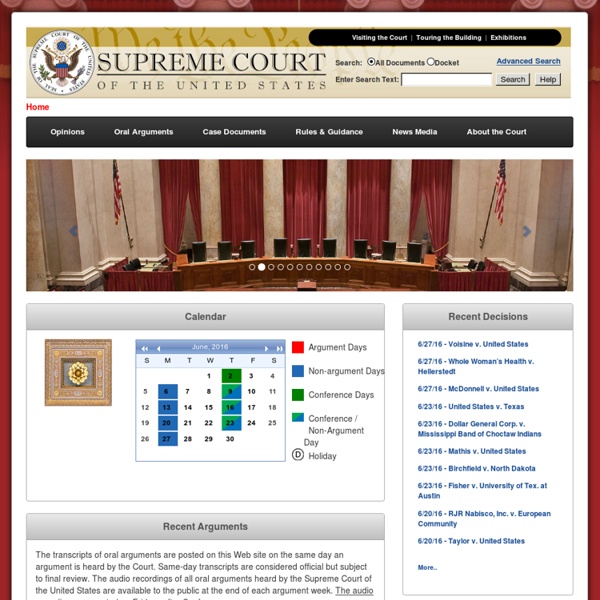



Guide to Law Online The Guide to Law Online, prepared by the Law Library of Congress Public Services Division, is an annotated guide to sources of information on government and law available online. It includes selected links to useful and reliable sites for legal information. The Guide to Law Online is an annotated compendium of Internet links; a portal of Internet sources of interest to legal researchers. United States courts of appeals The United States courts of appeals (or circuit courts) are the intermediate appellate courts of the United States federal court system. A court of appeals decides appeals from the district courts within its federal judicial circuit, and in some instances from other designated federal courts and administrative agencies. The United States Courts of Appeals are considered among the most powerful and influential courts in the United States. Because of their ability to set legal precedent in regions that cover millions of people, the United States Courts of Appeals have strong policy influence on U.S. law. Moreover, because the U.S. Supreme Court chooses to hear fewer than 100 of the more than 10,000 cases filed with it annually, the United States Courts of Appeals serve as the final arbiter on most federal cases.
Supreme Court - supreme_court What's New May Oral Argument Calendar Announced (Apr 4, 2014)The Supreme Court has placed 12 cases on its calendar for hearing on May 6 and 7 at the Ronald M. George State Office Complex, Earl Warren Building, 350 McAllister Street, Fourth Floor, San Francisco, California Supreme Court Appoints Four Members to the Applicant Evaluation and Nomination Committee for State Bar Court Judges (Mar 13, 2014)The California Supreme Court today announced the appointment of four members to the court’s Applicant Evaluation and Nomination Committee, which solicits and evaluates applicants for appointment to the State Bar Court.
Vocabulary: Political Words Every clique has its own language — an insider's jargon that people outside the group don't always understand. Filmmakers talk about "panning" and "fading." Retailers talk about "floor sales" and "back orders." Board of Educ. v. Pico First, the plurality argues that the right to receive ideas is derived in part from the sender's First Amendment rights to [p888] send them. Yet we have previously held that a sender's rights are not absolute. Rowan v. Emory Law: Electronic Resources The following is a list of subscription-based law related electronic resources and databases with a brief description of each. For a list arranged by subject, go here: Electronic Resources -- By Subject The symbols following most references to online resources indicate the access policies that apply to those databases: = Accessible on Emory campus = Accessible in Law School
European Court of Human Rights Building of the European Court of Human Rights The European Court of Human Rights (ECtHR; French: Cour européenne des droits de l’homme) is a supra-national or international court established by the European Convention on Human Rights. It hears applications alleging that a contracting state has breached one or more of the human rights provisions concerning civil and political rights set out in the Convention and its protocols. An application can be lodged by an individual, a group of individuals or one or more of the other contracting states, and, besides judgments, the Court can also issue advisory opinions. The Convention was adopted within the context of the Council of Europe, and all of its 47 member states are contracting parties to the Convention. The Court is based in Strasbourg, France.
District Courts The United States district courts are the trial courts of the federal court system. Within limits set by Congress and the Constitution, the district courts have jurisdiction to hear nearly all categories of federal cases, including both civil and criminal matters. Every day hundreds of people across the nation are selected for jury duty and help decide some of these cases. There are 94 federal judicial districts, including at least one district in each state, the District of Columbia and Puerto Rico. Three territories of the United States -- the Virgin Islands, Guam, and the Northern Mariana Islands -- have district courts that hear federal cases, including bankruptcy cases. (Printable Circuit/District map (pdf))
The 2012 tech primary - Kim Hart As GOP presidential contenders stump for votes from Iowa to New Hampshire to South Carolina, Google, Facebook and Twitter are in a race of their own — for millions of dollars in political ads. The tech giants are offering candidates new ways to advertise — Mitt Romney has spots on YouTube and Rick Perry’s Facebook ads target Christian college kids in South Carolina — and hiring political consultants, sponsoring debates and poaching from each other’s ad sales teams to jockey for the top spot in political social media circles. Continue Reading “This is the Twitter election,” boasted Peter Greenberger, who Twitter recently lured away from Google, where he started the search giant’s political ad sales team in 2007.
Cases and Codes Cases citing this case: Supreme CourtCases citing this case: Circuit Courts BOARD OF EDUCATION v. PICO, 457 U.S. 853 (1982) BOARD OF EDUCATION, ISLAND TREES UNION FREE SCHOOL DISTRICT NO. 26, ET AL. Emerging global networks for free access to law: WorldLII’s strategies Graham Greenleaf, Philip Chung and Andrew Mowbray Co-Directors, AustLII & WorldLII* 1. The emerging ‘free access to law’ network 1.1. The challenges of global legal research